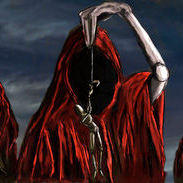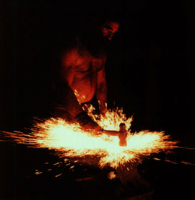OOC: Ok, I took a stab at Alchemy, please read and keep an open mind. I have seen way too many games that allow Alchemists an all to easy path to money and fame. Besides, the comedy of brewing a potion and having it explode and turn you blue for a week is just to good not to add.
Alchemy is a discipline of world magic that allows the user to transmute attributes between materials using ingredients, activation glyphs, and a formula. Ingredients are chosen based on the attributes that the Alchemist wishes to transfer into a material. Activation glyphs are used to focus the very essence of the ingredient and release it into the Alchemists brew.
The formula is often the most guarded secret within Alchemy. Alchemist formulas describe the ingredients, activation runes to be used, and the steps in which the essence should be released into the brew. Formulas are often measured by how many steps, the potency of the final product, and the yield of the formula. Many Master Alchemist have tried to get the yield of lead into gold down from the one in twenty chances to something in the range of one in five. Also, using current formulas the amount of gold produced from lead is roughly three times the cost of gold itself.
Be worn though, Alchemy has hidden dangers, even though an apprentice of this magic can transmute lead into gold with the proper ingredients and formula; with each step in the formula there are inherent contaminants within the ingredients and the purity of the surroundings. Example of this is that bog peat lifted from the swamp’s waters under a moonless night, has the greatest chance of transfer the attribute of light absorption. However, there is only a one in four chance that it will do so, and three in four chances that it will release a noxious cloud within the Alchemist’s laboratory. An Alchemist may also choose to substitute an ingredient for another less costly one or less pure. This may decrease the chances of success and increase the danger to the Alchemist as well.
Contents
• 1 Overview
• 2 Glyphs
• 3 Sigils
• 4 Scrolls
• 5 Progression
• 6 Roleplaying Tips
o 6.1 First thread
o 6.2 Roleplaying progression
o 6.3 Drawing the actual runes
o 6.4 Can I do this?
Overview
Long ago, before the Valterrian, Alchemy was used to provide medicine, tonics, even magical effects for short times. Alchemist’s practiced their trade within the capital city of Suva on Honeysuckle Street. Apothecaries and Alchemists factories lined the street and for a price anything could be had; a draft of luck, a paste of light absorption, sweetbalm, and even an illegal lust potion. When the world went mad, contamination of the ingredients increased and many alchemists died trying to prepare the most simple of vials, and with their death, thieves would enter the workshops and steal the priceless grimoires of formulas and any prepared vials still left. As less experience alchemists tried their hands at the stolen formulas, they found that the Valterrian had changed some of the attributes within the ingredients, making some priceless formula’s useless. In today’s world, and alchemist’s shop may be found in a greater city, and probably some of the high yielding low potency brews.
Theory
Alchemist’s have debated for a very long time on how it all works. The most well known theories describe a sphere, and within this sphere are the purist examples of attributes. Alchemy uses purify Djed of objects to pull the object closer to a point within this sphere that they desire. Since every object is made of many attributes, sometimes the alchemist pulls his brew in the wrong direction and releases something unexpected. In fact this was how many of the first formulas were discovered. With the tearing of the world, some alchemist’s believe that the sphere of attributes has been jumbled up as well.
Though a master will teach his own theory to his apprentice, there is one rule that is universally agreed on. The Doctrine of Signatures states: “The attributes without mirror the powers within.”
In Practice
Though there are many theories on ingredients, ink used in the activation glyphs, and procedural steps, in practice most Alchemists follow the grimoires of their masters, rarely deviating from them. A master will teach an apprentice how to read and write alchemist glyphs (a specific form of Glyphing), math, and cultivation of attribute techniques.
Math is used in calculating chances of success of the formula and whether the formula is balanced correctly.
Alchemist glyphs channel the attribute into the brew while using the essence of the rest of the object as its source of Djed. The glyphs are usually thought as of pulling all the unwanted essence into them and dissipating them into the world again. Arguments on time for the dissipation to occur are in Alchemists journals, as well as, which material is best suited for the dissipation. However, the technique is for the Alchemist to draw a circle around his brew, place drawing glyphs on the outside of the circle, placed the ingredients in, and then write the activation glyph on the four cardinal points. The circle can be as large as a room for alchemist factories or as small as a single glass vial. For alchemist factories that perform operation over and over again, circles of lead and glyphs of lead are used. The circles are often poured into a stone ground, and only the activation rune is chalked every time on the four cardinal points then washed away for the next use.
Cultivation of attributes techniques’ usually takes years for the apprentice to learn, and includes gardening, operation of apparatus for distilling, placement of lens to magnify light, to name a few. Most alchemists, however, will only spend their time cultivating the rarest of ingredients for their formulas. Using less pure but common ingredients found in apothecaries for the majority of the formula steps. This way they keep the cost down of the brew and only decrease the yield of the formula slightly. In the past, special apothecaries were setup just for alchemists, merchants that understood that the alchemist took the greatest risk by combining the ingredients would play on their fears and charge heavy fees for the purists of samples. It was common for merchant to force alchemists to labor for them in factories if there debt was too great. It wasn’t till the formulation of the alchemist’s guild that stopped the unbalanced apothecaries might and enslavement. They would task first year apprentices to cultivation of common ingredients. In today’s world the guild was destroyed with the upturn of the world, and many adventures still look for its ruins. Alchemists talk about formulation of another guild, but since they are still too few the idea does not have the financial backing needed.
The first warning an Alchemist tells to his apprentice is to never use Personal Djed to help purify the ingredient during activation. Many Alchemists have learned Warding, as a precaution to their experiments, but few have every tried to help increase their success with the use of Personal Djed. The risk is that the circle will sense the contamination of the casters Personal Djed and began to dissipate back into the world. The Alchemist’s Guildmasters tried it several times throughout their history and lost several highly accredited Masters to such experiments.
Progression
NOVICE (1-25)
The Alchemist only understands the basic techniques of Alchemy. Simple formulas can be activated with poor chances of success, even then a Master will watch over the novice to make sure he survives a badly brewed potion. The Alchemist will learn be learning cultivation techniques’ and alchemist glyphs to increase his chances of success. Time spent in the laboratory smelling brews and checking liquid clarity will take quite a bit of his time.
COMPETENT (26-50)
The Alchemist can, most of the time, successfully brew low potency potions and make money. The Alchemist can begin buying equipment for his/her own lab and their Master is comfortable letting them transcribe some of the most basic formulas. The Alchemist can risk too brew moderate potent potions, but the same dangers exist, and profitability isn’t assured. At this point the Alchemist knows enough to evaluate formula and the chances for success. Furthermore, they have enough knowledge to substitute ingredients in their brews.
EXPERT (51-75)
The Alchemist has become a master in their own right. Complex formula’s can be used and only hold slight chance of mishap due to the Alchemist’s hands. Beware though, complex formulas are often hazard enough without mishandling them. At this time, the Alchemist may try to shorten steps of previous known formula or make completely new ones. The Alchemist may even take on a gardener or apprentice to help with the chores around the lab.
MASTER (76-100)
The Alchemist has reached the pinnacle of study. Very complex formulas can be used and hold only the inherent chance of failure. The Alchemist has used certain ingredients so often that he/she may understand that drawing another glyph prior to activation will increase its chances of success. Low potency formula’s can be improved to have a greater than 75 in 100 chances of success. The Alchemist has probably created quite a few new formulas and probably has multiple of apprentices seeking his teaching. The alchemist can make potions like the Draft of Luck, one slip and the person can succeed at one task by luck alone. With enough time and ingredients he/she might even be able to create a potion of youth. Of course, it might take many months of brewing and dangerous risks to create, but then again what price can one place on their youth?
Roleplaying Tips
First thread
You can learn Alchemy from users or books. However, books often assume that the user has some training to began with, without a User to help you, your potions could end up turning you blue. Your first Alchemy thread should have the PC learn the very basics, such as:
• What Alchemy is and is not
• Alchemy glyphs, proper placement around the circle, and Activation Glyphs
• Attributes of a few ingredients
• Brewing your first potion
• A simple formula; for example, Sweetbalm, when drunk the person enters a restful state and heals minor injuries. Also, the risks of brewing such a potion.
Roleplaying progression
Progression is easy to roleplay, as your PC does not have to learn any new concepts, he or she just gets so much better at using the basic concepts. Or with the discovery a new formula or brewing technique your PC can send weeks practicing it on their various formulas. Remember not every trial is a success, nor does it have to be a fatal disaster. Perhaps in the second step of your formula you find that the brew is too cloudy to continue and you have to throw away some of it. The only risk one assumes is the risk of pressing their luck with inferior materials.
Brewing
Each formula is different from Alchemist to Alchemist, so feel free to be creative with the ingredients at hand, just be logical as well. Nightshade shouldn’t be used in the creation of healing draft.
Can I do this?
You can certainly try and see if your moderator will let you brew a potion at your current skill level. Your moderator will probably give you a success rate when you learn the formula, check before substituting ingredients or trying to shorten the steps. Remember alchemy is a dangerous activity in Mizahar and try to take precautions.
- Getting Started
- Help
- Master Lists
- Useful Links
- Features
Alchemy (Skill Describation)
(This is a thread from Mizahar's fantasy role playing forum. Why don't you register today? This message is not shown when you are logged in. Come roleplay with us, it's fun!)Moderator: Scribes
5 posts • Page 1 of 1
-

Ethan Blackfoot - Player
- Posts: 12
- Words: 5957
- Joined roleplay: July 13th, 2009, 9:34 pm
- Race: Human
- Character sheet
Re: Alchemy (Skill Describation)
| Tarot's thread tickets: sold out. Not accepting any more threads for the time being unless I promised you one. Sorry for the inconvenience! |
-

Tarot - May you live in interesting times
- Posts: 2216
- Words: 766315
- Joined roleplay: March 23rd, 2009, 4:29 pm
- Location: Moderation abilities game-wide
- Blog: View Blog (11)
- Race: Staff account
- Office
- Scrapbook
- Plotnotes
- Medals: 5
-


-


-

-

Gossamer - Words reveal soul.
- Posts: 21154
- Words: 6363131
- Joined roleplay: March 23rd, 2009, 4:40 pm
- Location: Founder
- Blog: View Blog (24)
- Race: Staff account
- Office
- Scrapbook
- Plotnotes
- Medals: 11
-


-


-


-


-


-

Maddox - A man with a mission
- Posts: 18
- Words: 7865
- Joined roleplay: November 10th, 2009, 3:28 am
- Race: Kelvic
- Character sheet
- Scrapbook
- Medals: 1
-

-

Gossamer - Words reveal soul.
- Posts: 21154
- Words: 6363131
- Joined roleplay: March 23rd, 2009, 4:40 pm
- Location: Founder
- Blog: View Blog (24)
- Race: Staff account
- Office
- Scrapbook
- Plotnotes
- Medals: 11
-


-


-


-


-


5 posts • Page 1 of 1
Who is online
Users browsing this forum: No registered users and 0 guests
